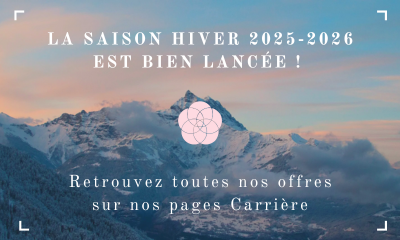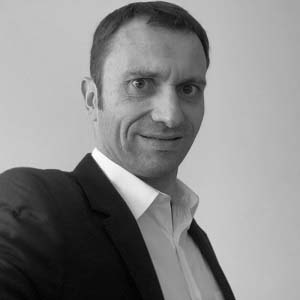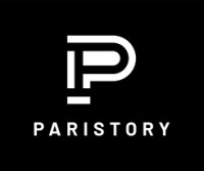 |
INTERVIEW - ALEXANDRA AND JULIE MARANG, PARISTORY: 'WE WANT TO CONTINUE TO DEVELOP AT OUR OWN PACE, TO CONTINUE TO PERFORM, BUT NEVER AT THE EXPENSE OF OUR CUSTOMERS OR OUR EMPLOYEES' (France)
At the helm of Paristory for the past five years, the two sisters are continuing the work begun several years ago by their father, Gilles, to sublimate the luxury hotel industry. Always with passion, excellence and a desire to put people first. |
Catégorie : Europe - France - Interviews et portraits
- Interviews
Interview de Guillaume Chollier le lundi 25 novembre 2024
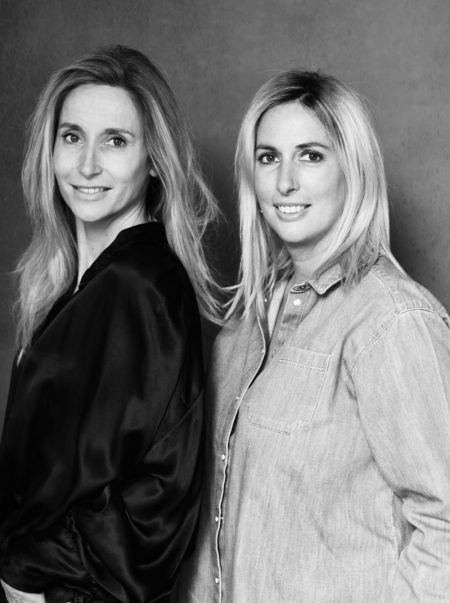 Alexandra and Julie Marang have been heading Paris Story since 2019
Crédit photo © Sylvia Galmont
Nestling in the heart of Paris's ‘golden triangle’, on Rue François 1er, this hotel in the Paristory collection offers a warm atmosphere that contrasts with the greyness outside. With its attentive staff, personalised attention and chocolates, nothing is missing from this meeting between the Journal des Palaces and the Marang sisters, Alexandra and Julie, who took over the group founded by their father, Gilles, in 2021.
Alexandra, the eldest, comes from the world of jewellery. She spent eight years at Cartier, part of the Richemont group, and two at Chaumet, part of the LVMH group, where she was head of communications. In 2009, she joined her father for a trial. A trial and a master stroke! Enthused by the sector, she took on more and more responsibilities within the group, and was soon managing its establishments. Following the health crisis, the patriarch took a step back and Alexandra Marang needed support. It was then that Julie, her sister, joined the family fold, which included the Grand Powers and the Grand Hôtel du Palais Royal.
With a background in advertising, Julie Marang sold advertising space for Air France Magazine, Air France Madame and the Decaux and Lagardère groups. She then joined a luxury communications agency in the fashion sector as the agency's sales director. She then set up her own showroom and worked as an agent for fashion designers, looking after their commercial development worldwide. Equally fascinated by the world of luxury hotels, she wouldn't change profession for the world.
Totally passionate about the sector and involved in the management of Paristory, the two sisters are not slow to sit down to dinner. And they do so with a relaxed, warmth and smiles that almost make us forget the gloom of the rain that continues to pour down outside.
Journal des Palaces: How did your passion for this sector come about?
Julie Marang: We've been immersed in it since we were kids. Our father used to talk about it at home in the evenings, and we'd see him coming back from trade fairs with bags of goodies. And we spent a lot of time in hotels. Our father was passionate about hotels, so when we travelled the choice of hotel was really important. As a result, we got this eye for the job quite early on.
Alexandra Marang: In our previous lives, we travelled a lot for professional reasons, and we found ourselves ‘jetlagged’ to the other side of the world, in very impersonal establishments, and I think that made us want to think a bit like the hotels we'd want to be in if we were travelling and ended up in Paris.
How would you define luxury hotels?
Julie Marang: Obviously, luxury hotels are all about the services provided by the hotel itself. But luxury hotels are also about service. It's the level of attention that is given to each customer, it's the fact of never saying no to a request, within the limits of what is possible, acceptable and legal, of course. The luxury hotel business means being able to anticipate customer expectations, ensuring that travellers find the attention that makes them feel at home, even though they have travelled a long way and are far from their children and family.
I think this is where we certainly make the difference compared to other hotels. And that's what we focus on with our teams. And they know that they have a great deal of freedom to satisfy the customer. We don't just check in and hand over the key. There's a kindness, a sincerity, a generosity that I think is very present in our teams and that inevitably makes their job much more rewarding. For example, one of our team members, who loves running, regularly offers to accompany our sporting customers to show them a route that they may not be familiar with, pausing to take photos. It's a real plus for our customers.
Our guest relations officers research the person's Instagram profiles, if they're open, or on the Internet, to see what their hobbies are, so that they can prepare the most personalised attention possible. We really want to surprise and please.
How has the DNA of this family-run group, founded in 1990, evolved?
Alexandra Marang: The group was almost created by chance. Our father was a property developer. He set up his company when he left business school. I think he worked for a property broker for a year before setting up his own company to build buildings in Paris. In 1990, he felt the crisis coming on. He decided that he had to find a second activity in which he could use his skills to try to get through the crisis. Thanks to his construction skills and the very good relations he had, both with the building companies he had worked with for a long time, and with the banks, he bought his first hotel. Then a second. He fell in love with the business and became passionate about it.
To find out more about the sector, he became an Accor franchisee. There were several Mercure hotels. Then he stopped working with Accor to become a Holliday Inn franchisee. He then became completely independent, with hotels in the fifteenth arrondissement of Paris. Then it moved closer to the more prestigious, more central areas of Paris, in the eighth, sixteenth and seventeenth arrondissements.
You have just changed the name of your group, which is now called Paristory. What are the reasons for this change?
Julie Marang: There are several reasons for this change. Firstly, the names of the big Parisian hotels are very long, not easy to remember and complicated for foreigners, who make up 85% of our clientele. We wanted a shorter name that would be easier to translate and, above all, more representative of our values.
We kept the reference to Paris, because that's the heart of our business and we're proud to be present in all these key districts of Paris. As for the term ‘story’, we said to ourselves that our business, the hotel business, is all about telling stories, beautiful stories. There's our family history, which we've passed on to our teams, who in turn pass it on to our customers. Our customers also often come to us for a particular reason: a wedding anniversary, a family event... In the end, there are many stories that are woven together. That's why our visual identity is a reworked map of Paris, which is reflected in many of the elements of our signature. These intertwining streets represent all the stories that can come together, and they also allow our teams to identify with a stronger group name.
Is it your ambition to develop the group with new openings?
Julie Marang: We have a hotel, the Prince de Conti, in the sixth arrondissement, a former three-star hotel that we bought just over a year ago and on which renovation work has just begun. When the renovations are complete, this establishment will be a four-star hotel, but a ‘four-star plus plus’, with a very carefully designed interior, fine historical references and services worthy of a five-star hotel. In reality, it will only be able to claim five stars, as defined by Atout France, because of the size of its rooms.
Alexandra Marang: We are keeping a close eye on any opportunities that may arise to acquire a new hotel. But we are very demanding in terms of neighbourhood: either in the eighth arrondissement, the first or the sixth. We really want to stay in these key locations, which we know will enable us to create synergies and pool staff and services. We see these areas as the most emblematic of Paris, the most popular with tourists, the most prestigious and culturally exciting.
And you're focusing solely on Paris?
Julie Marang: After Covid, we looked at the Nice region to diversify. Especially as the provincial hotel industry has taken over from the Parisian one. And, after all, we love Paris so much, the way things work here, the clientele...
The other problem is the way we operate. We're in our hotel every day. When I'm not there every day, I don't feel well. I like people and teams and I need to be close to them. So, between our expertise in Paris and the fact that we couldn't be present on a daily basis in Nice, the avenue we had explored, we chose to remain concentrated here.
Apart from this hotel renovation project, do you have any other wishes?
Julie Marang: We still want to develop the group. We'd also like, perhaps, to use this success to make a slightly stronger social commitment. I think we already have a strong social commitment, in the way we manage and run our teams, which I think is quite important compared to the rest of the hotel world.
Alexandra Marang: Julie and I have always said, looking at the smaller hotel groups, that we wanted to continue to develop at our own pace, to continue to perform, but never at the expense of our customers or our employees. And that's what we stand for. At Paristory, we don't want a staff that isn't fulfilled, or a constant turnover. That's not our vision of the business. That's also why we're not aiming for 10 new hotels in the next five years. Now, if tomorrow a broker comes along and offers us premises and a fund in the eighth district at an attractive price, we won't close the door.
Sustainability and social responsibility are deeply rooted in Paristory's DNA. How does this manifest itself on a day-to-day basis?
Alexandra Marang: As far as my work is concerned, it's in the back of my mind at every level and I'm committed to developing it. For example, last year, at the same time as we were redoing the suites and refurbishing the façade, we changed the air conditioning and heating system at the Grand Hôtel du Palais-Royal.
We used to produce air-conditioning using fan convectors that ran on chilled water. In each fan coil unit, there was an electric resistance which produced the heating. This heating process was very energy-intensive, and the hydraulic networks that fed the fan coils and distributed the air conditioning were obsolete. So we replaced the convectors with heat pumps that can be operated either with air or water, to put it more simply. To ensure that as many of them as possible run on water, in an environmentally-friendly way, we decided to supply them by drilling into the water table, which is 28 metres deep. The water, which is at 14 degrees Celsius, rises in the circuits and is then returned to the water table, at 22 degrees Celsius in summer and 8 degrees Celsius in winter. It's an energy exchange that doesn't release any particles into the air, so it's extremely virtuous. And, as far as energy bills are concerned, although we don't have enough experience yet, we estimate savings of 30%.
In the same way, we've started cleaning up the Prince de Conti hotel in the sixth arrondissement, and we've called in a company called Second Œuvre, whose aim is to reuse and recycle the products, materials and equipment cleaned up. This means that nothing is thrown away, everything is recycled. That's why we chose it.
Of course, the buildings housing our hotels are eligible for the tertiary sector decree, which aims to reduce energy consumption by 60% by 2050. This obligation is incumbent on both the lessor and the occupier. So every year we declare our energy consumption on a platform, and then we are supported by a control office that will advise us on the actions we need to take to reduce consumption.
Julie Marang: Our kitchens are also extremely committed, as we very recently received our second Ecotable label. This has involved a total reorganisation of the kitchens: there is no plastic at all, the products are increasingly local, around 30% of our products are organic and we ensure a high level of traceability for all the products that go into the kitchen. We keep all the waste and work with a company that comes to collect it for composting. We have a small kitchen garden on the roof of the Grand Hôtel du Palais Royal, where the chef picks aromatic herbs, and our vegetables come from a farm in the Île-de-France region. We attach a great deal of importance to this locavore dimension. We also recycle all unused products, which we redistribute to charities, and we recondition all unused hospitality products, slippers, etc., which are also redistributed to charities. We also have a beehive with a beekeeper. The honey we serve at breakfast comes from these hives.
We are also very involved with the association Les Petits princes, which makes the dreams of sick children come true. This is a very interesting project, because it also involves our teams. And they are extremely committed and go out of their way to ensure that the children have an incredible and unforgettable time.
You attach great importance to well-being in the workplace...
Julie Marang: We pay a great deal of attention to this. That's why we organise outings between departments. Employees can take a day off on their birthday, either the day before or the day after, so that they can enjoy the moment with their loved ones. Depending on our occupancy rate, we also organise yoga or relaxation sessions in a suite. We also have a CSR committee where all employees can submit their ideas, and we send out a CSR newsletter to employees every month. It highlights all the improvements that have been made in the hotels, and gives CSR recipes and advice. We take part in industry events, such as the 10 km des Étoiles. Personally, I'd love to take part, but I'd have to train beforehand [laughs].
What advice would you give to a young person who wants to work in the luxury hotel sector?
Alexandra Marang: My advice would be to work in all departments. As far as I'm concerned, you only feel you belong when you know all the different jobs.
Julie Marang: My advice is to go for it. The hotel business is a passionate profession, with a career that can evolve and a host of different professions. It's an industry that's alive and kicking, in which the sense of contact and welcome exists nowhere else. Customer and team contact is invaluable. It's a magical business! And for us, when we see our teams happy, committed and happy to come to work every day, it's extremely gratifying!
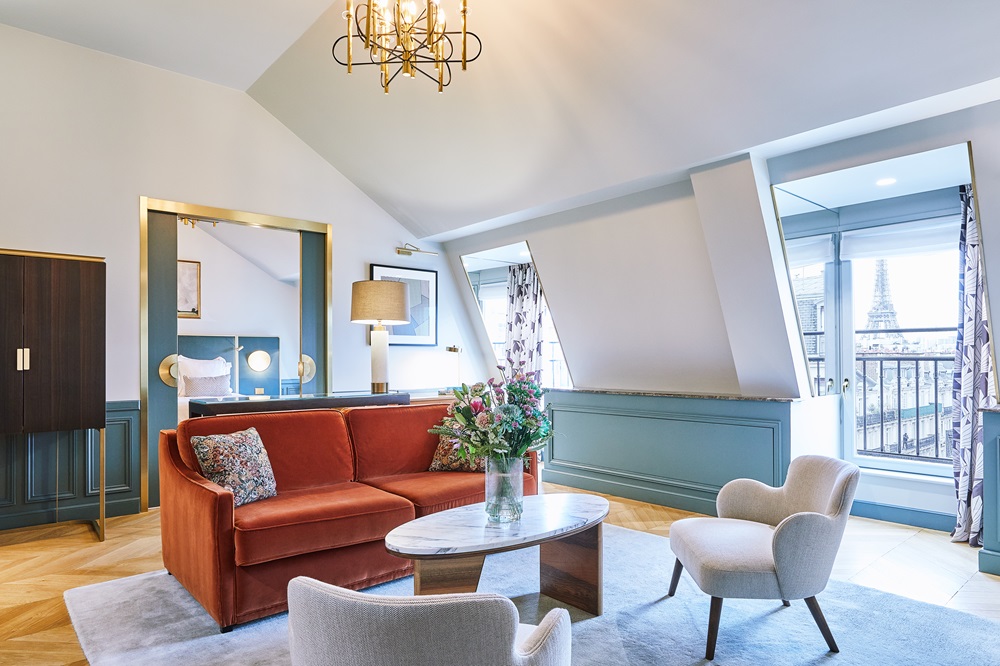 The Grand Powers rooms are decorated in a sober, warm style
Crédit photo © Johan Dastarac
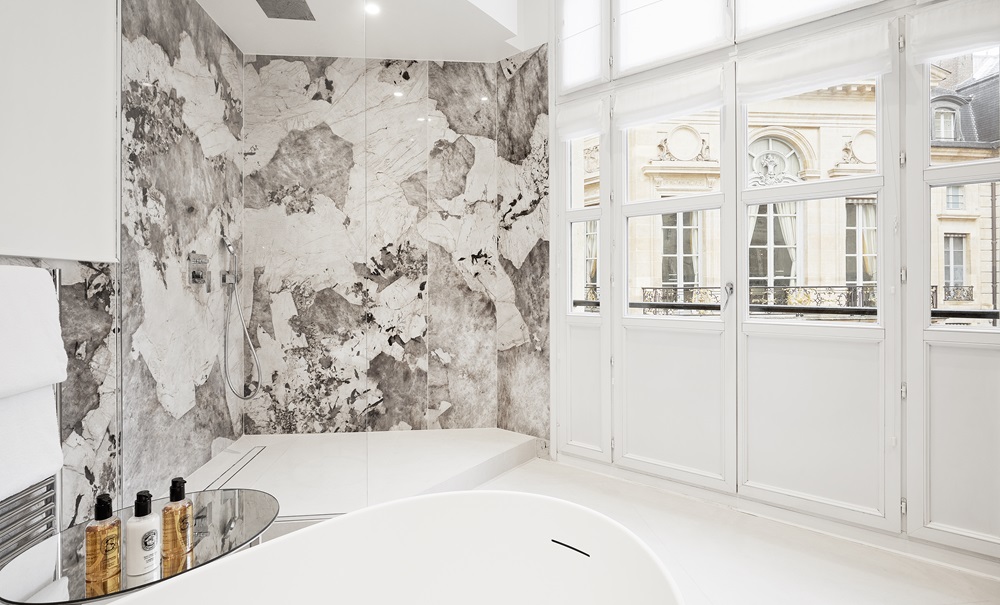 Luxury and elegance are the hallmarks of the bathroom in the Rooftop Suite at the Grand Hotel du Palais Royal
Crédit photo © Johan Dastarac
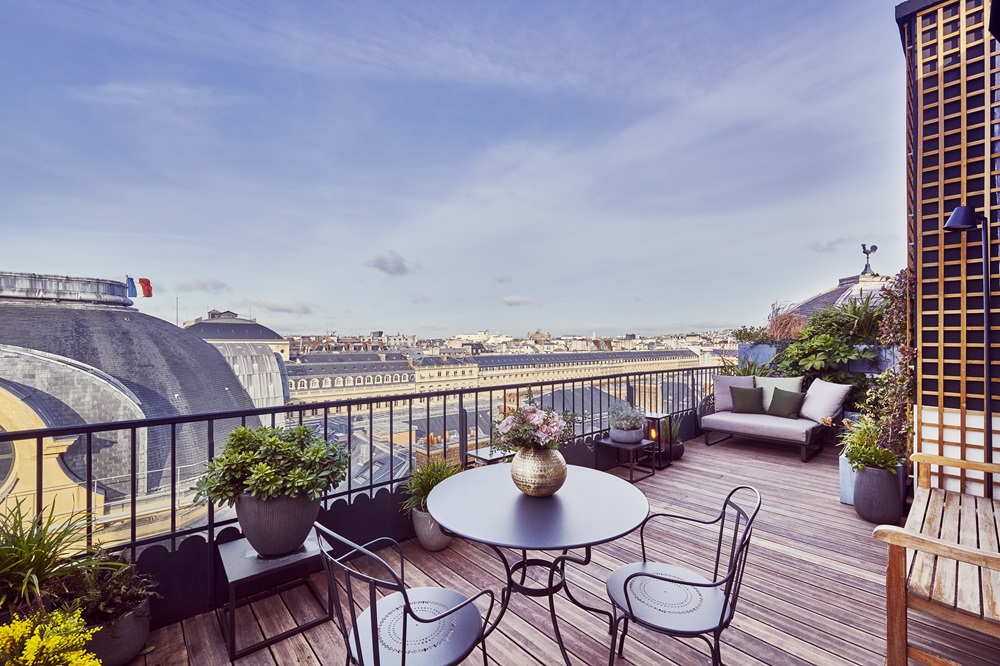 The panoramic terrace of the Rooftop Suite offers an incomparable view of the rooftops and monuments of Paris
Crédit photo © Johan Dastarac
|
|


